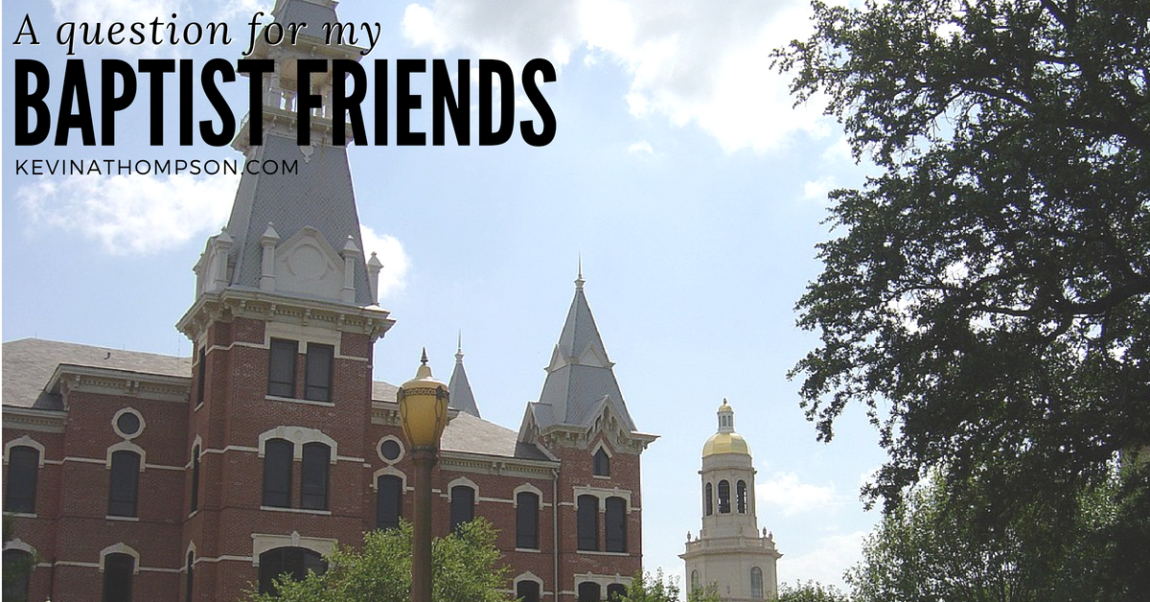I grew up in a great Baptist church. They loved me, taught me, and pointed me toward Jesus. As I felt my call to ministry, I was educated at two Baptist colleges. While the church I pastor is not Baptist in affiliation, its doctrine aligns with what I learned growing up and much of who I am is best described by the Baptist tradition.
So when I ask the question which is to follow, it’s not a question from an outsider looking in. I’m not about to ask, “What’s wrong with you” in an accusatory form as though I have it all together and anyone who calls themselves Baptist does not. Instead, I have a question for the Baptist family and I ask it as a son. It’s a question not about you, but a question about us.
The culture of sexual assault and abuse on the Baylor University campus has been well chronicled. Originally thought to be a limited issue within one team, it was eventually brought to light that the university culture as a whole failed to create a climate of health and safety. After years of investigation, there is still much to be learned and understood regarding what happened at Baylor.
In recent testimony, a former Baylor administrator revealed an aspect of Baylor’s defense plan. It’s that plan which should raise a question for all Baptists. Former athletic director Ian McCaw testified in a deposition that the plan of Baylor administrators was to scapegoat black athletes, particularly football players, in an attempt to protect the university’s reputation. They sought to protect donations and tuition by convincing Baylor supporters that the problem was not with the university as a whole, but was limited to big, black athletes. This leads to my question:
Why did powerful and intelligent men who are well acquainted with Baptist life assume the best way to distract Baptist donors was by blaming the problems on big, black men?
It’s a serious question. There is a time and place to litigate what happened at Baylor, but that’s not the point of this article. Instead, I want to understand why people who know us (and are of us) believe we would be so quick to fall for a story which scapegoats black men.
Salespeople often know us better than we know ourselves. While we assume our motives are pure and our decisions are rational, they understand our internal biases and hidden motivations. They know how to motivate us and move us. Regents at a University wear many hats, but salespeople is one of the most prominent. They must convince others to send their money and children to the University.
If they had a plan to blame their problems on big, black men, they had good reason to believe that many white, Baptist moms and dads would be quick to believe the problems were the fault of big, black men rather than the culture which old, white men created and protected.
In theory, if there is anyone who shouldn’t believe in or be motivated by racism, it’s Baptists. We believe all people are created in the image of God–valuable because of God’s image within them. We believe Jesus died for all people no matter their color of skin. We believe heaven will be composed of every tongue, tribe, and nation. We believe in the priesthood of the believer meaning that every person has the ability to know God without the need of someone standing between them and God. Based on doctrine, Baptists more than anyone should be void of racist thoughts and actions.
Of course, history shows a different story. Tragically Baptists are like every other religious tradition having a long history of racism. And a current present with racism. While we acknowledge our past, too many of us are quick to deny our present struggles. The Baylor story confirms our plight. When the successful salespeople think they can dupe us by blaming black men, we have to assume we are prone to believing false stories about black men.
We have to ask why. (See: What a White Man Knows About Racism)
Why are we quick to assume people of color are the likely cause of problems? Why do we quickly assume white men are innocent and black men are guilty? Why are we prone to believe stories which are not true if white people are the victims and black people are the perpetrators? Why?
And could it be that this is the very thing happening in another area of life? Notice how quick the President is to use the words “rape” and “rapists” when talking about the topic of immigration. And it’s not just immigration in general, but immigration along the southern border where people of darker skin are trying to enter the country. Why does he continually sell the story that they might be rapists when studies consistently show that immigrants are LESS likely to be involved in criminal activity than the general population. Why would the word “rapists” be so prevalent in a discussion where it seemingly has no purpose? Is it because the President is speaking primarily to his base–a white, evangelical base? Does the President know what the Baylor regents knew–Baptists are motivated when you claim people of color are dangerous?
These are hard questions, but they must be asked. However, they aren’t just questions for my Baptist friends. They are legitimate questions for every evangelical…all of us. We must look at ourselves and try to understand why we are so quick to scapegoat people of color. Why, when our safety is threatened, are we more prone to believe bad about people of color and the good of people who look like us?




5 Responses to A Question for My Baptist Friends